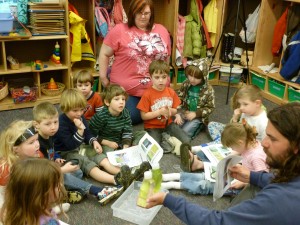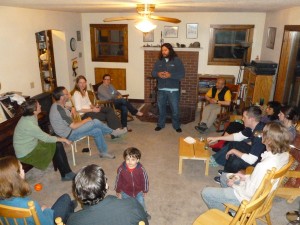Background:
In 2011, the Research Ambassador Program (RAP) recruited ten Fellows to come to the Evergreen State College campus for intensive training in communication of their research to non-traditional audiences. This allowed the Fellows to gain personalized guidance on disseminating their own research to established groups and create springboards for outreach in their home communities, and for the RAP staff to evaluate the efficacy of their activities.
Bio
Alan Wilson grew up in Atlanta, Georgia, where he became attached to the area’s numerous urban fishing opportunities. After completing his A.S. in Biology in 1995 at Young Harris College, a junior college in north Georgia, Alan entered the University of North Carolina at Chapel Hill where he earned a B.A. in Biology in 1997. In 1998, Alan started his M.S. in Fisheries and Wildlife at Michigan State University where he worked on field-based studies elucidating the effect of the exotic bivalve, Dreissena polymorpha, on plankton community structure in lakes throughout Michigan. In 2001, Alan entered a Ph.D. program in Applied Biology at the Georgia Institute of Technology where he studied the ecological, chemical, and genetic mechanisms mediating planktonic plant-herbivore interactions.
After receiving his Ph.D. in 2006, Alan spent a year as a research investigator at the Cooperative Institute for Limnology and Ecosystems Research, jointly housed at the University of Michigan and NOAA’s Great Lakes Environmental Research Laboratory. There, he studied the potential human health hazards of cyanobacterial blooms in Lake Erie. Since 2007, Alan has been an Assistant Professor in the Department of Fisheries and Allied Aquacultures at Auburn University, where he currently manages projects with the support of his two graduate and four undergraduate students.
Alan’s research interests center around the ecological mechanisms mediating harmful algal blooms. He is interested in understanding how intraspecific genetic and phenotypic variation influences the promotion and control of toxic cyanobacterial blooms. Alan is also studies on how toxic algal blooms influence human and livestock health.
Components of his Fellowship
Communications Mentoring
RAP staff walked through Alan’s draft PowerPoint presentations, offering pointers and clarifications, and adjustments to make the presentations appropriate for specific audiences that Alan spoke to or wrote for, based on established contacts and experiences. RAP staff also helped Alan distill a statement of his primary research interests.
Mission Creek Corrections Center for Women
In partnership with the Sustainable Prisons Project, Alan spoke to 30 offenders and staff at the Mission Creek Corrections Center for Women. Alan provided a basic orientation to pollutants and harms to freshwater ecosystems, and an introduction to his research involving blue-green algae.
The inmates demonstrated a high level of understanding of the ecology discussed as they probed into the causes and consequences of eutrophication’ during the question and answer period.
Business Brainstorm: The Shellfish Industry
The local aquaculture industry produces oysters, clams, mussels and geoducks in Puget Sound waters. Aquaculture is only successful if water quality is high; the shellfish industry has a vested interest in healthy freshwater and marine ecosystems.
RAP Staff, Alan, and a member of the local shellfish industry met to discuss their fields and perspectives, identifying where interests intersected and potential collaboration could occur. Locally, the industry has been impacted by dramatic shifts in pH in sound waters, so there is a keen interest in both supporting scientists who are studying causes and effects, and hearing from scientists who are conducting related research.
Dinner Party: Outreach Anywhere
During his visit, the Research Ambassador Program hosted a dinner party. Here Alan was challenged to present his research during an impromptu 15-20 minute presentation, with no visual aids. This provided key evidence that you can indeed conduct outreach anywhere, and that despite our reliance on PowerPoint and visual aids.
The Evergreen State College Campus Children’s Center
Although science curricula and standards are common for K-12 education, there is little attention to introducing 3 – 5 year olds to science or scientific concepts.
Alan introduced twelve 4-5 year olds at The Evergreen State College Campus Children’s Center to algae and the small Daphnia that consume algae. By looking at different samples of water, the children were able to grasp just how much algae Daphnia are able to consume.

Film Festival & Theatre
During Alan’s visit, the local Olympia Film Society was hosting the annual Environmental Film Festival. The Festival included a showing of the film Sola: Louisiana Water Stories. The film includes discussion of numerous pollutants in freshwater ecosystems, including excess fertilizer inputs. Alan presented a short talk after the film discussing freshwater ecology and algae blooms, and opportunities for questions.
Reflections and Lessons Learned
Alan’s presentation during the dinner party was his most challenging. However, this opportunity further supported Alan’s interest to better develop his science talk for general audiences.
The Olympia Film Society presentation provided a new type of opportunity for scientists to engage. Such a venue provides another outreach model that scientists can potentially replicate in their home communities.
Aftermath:
Communication after Alan’s return to his home institution included the following:
- RAP staff arranged to have the Provost at Evergreen send a formal letter of acknowledgment to his Dean, Department Head, Provost, and others so that he receives an appropriate acknowledgment regarding his recent outreach training;
- RAP staff invited him to participate in an upcoming workshop on the RAP at the annual meeting of the Ecological Society of America
- Since returning home, Alan has talked to the daycare center that his three year old daughter attends and given several talks to classrooms of three year olds.
- Alan has also contacted a local work-release center for prisoners preparing to re-enter society and is preparing to offer a freshwater ecology presentation. This mirrors the efforts of the Sustainable Prisons Project to provide opportunities for prisoners to engage with science and conservation.
